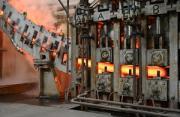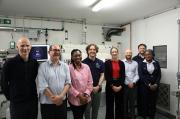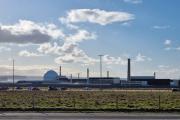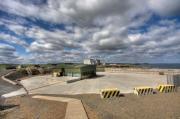
This site uses cookies, by continuing to use this site you accept the terms of our privacy policy
Feed 2.0 Loading...
UKAEA Fined �15,000 - MARSHALL LAB - IMPROVEMENTS TO PROCEDURES MADE
12th July 2007
Improvements have been made to the UKAEA's procedures for temporary waste storage following shortcomings identified by the Nuclear Installations Inspectorate.
Speaking outside Wick Sheriff Court, where UKAEA was fined �15,000 after pleading guilty to the charge, Simon Middlemas, Dounreay's site director said "We accept some mistakes were made in the Marshall Lab at the beginning of last year resulting in a worker receiving a very minimal plutonium intake. It should not have happened and we, very quickly, addressed a number of issues highlighted by the NII."
UKAEA's director of safety, Dr John Crofts said "Our procedures have been tightened and a number of behavioural safety initiatives have been set in place to ensure this that type of incident should never occur again."
The Fuel Cycle Laboratory (known as the Marshall Lab) was built in 1981 and carried out development and proving trials for the Thermal Oxide Reprocessing Plant (THORP) at Sellafield, for the Japanese MOX (mixed-oxide fuel) reprocessing programme and for the EDRP (European Demonstration Reprocessing Plant) design. Work is now underway to decommission the plant.
The charge relates to an incident which occurred in January 2006 where two employees were found to have an elevated personal air sampler reading after undertaking some wok in the decontamination room located near the alpha lab. The work being carried out related to the storage of lead bricks and their subsequent disposal as intermediate level waste.
Related Businesses
Related Articles
10/1/2025
Fusion-grade Steel Produced At Scale In UK-first
Researchers achieve 10x production cost savings for reduced activation steel. A United Kingdom Atomic Energy Authority (UKAEA) working group has successfully demonstrated the industrial scale production of fusion-grade steel.
22/12/2024
UKAEA To Lead The Creation Of A Robotics And AI Cluster
UKAEA will lead the creation of a new £4.9m nuclear robotics and artificial intelligence cluster across Cumbria and Oxfordshire. The robotics and AI cluster was announced by UK Research and Innovation (UKRI) as one of seven new projects to kickstart economic growth and address regional needs: www.ukri.org The robotics and AI cluster will link Cumbria and Oxfordshire to accelerate the decommissioning of the UK's legacy nuclear fission facilities and keep people out of hazardous environments.
5/12/2024
Diamonds Are Forever? World-first Carbon-14 Diamond Battery Made In Uk
The world's first carbon-14 diamond has been produced with the potential to provide power for thousands of years. Scientists and engineers from the UK Atomic Energy Authority (UKAEA) and the University of Bristol have successfully created the world's first carbon-14 diamond battery.
4/11/2024
UKAEA Monthly Newsletter Latest Edition
Find out what has been happening at UKAEA in our monthly newsletter. Read about our recent activities and upcoming events.
1/10/2024
UKAEA Newsletter - Edition 11 Published Today
Find out what has been happening at UKAEA in our monthly newsletter. Read about our recent activities and upcoming events.
23/5/2024
Corwm Visits Dounreay Nuclear Site
Members were given an overview of the scale of the problem and challenges faced in the decommissioning of the site. In the last week of March 2024, several members of CoRWM led by the Chair, Sir Nigel Thrift, made the long journey up to the North of Scotland to visit the Dounreay nuclear site, now managed by Nuclear Restoration Services.
5/3/2021
Design Contract Awarded For Dounreay Shaft And Silo Work
Dounreay has awarded an important waste clean-up contract to Jacobs as the site plans for the future of its deepest historic radioactive waste store. Jacobs and its supporting partners have been awarded a 6-year contract to provide a design management team to produce a fully integrated design for the shaft and silo project.
6/11/2013
Radiation dose to public from Dounreay reduces
Dounreay�s radioactive impact on the environment continues to fall, according to a report. The annual survey report �Radioactivity in Food and the Environment� (RIFE 2012) has recently been published and it can be read here - http://www.sepa.org.uk/radioactive_substances/publications/rife_reports.aspx The report uses data obtained from samples of air, fresh water, grass, soil, and locally sourced meat, fish, milk and vegetables during 2012.
6/4/2012
57,000 Tonnes Of Hazardous Materials Finally Dealt With At Dounreay
Dounreay today completed the destruction of one of the most hazardous legacies of Britain's earliest atomic research. A purpose-built chemical plant processed the last of 57,000 litres of liquid metal lifted from the primary cooling circuit of the experimental fast breeder reactor.24/3/2011



